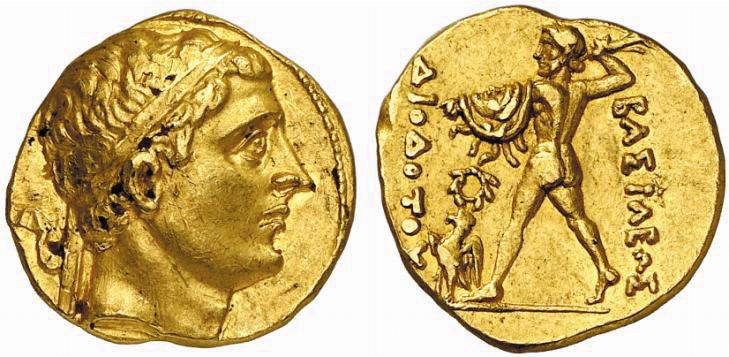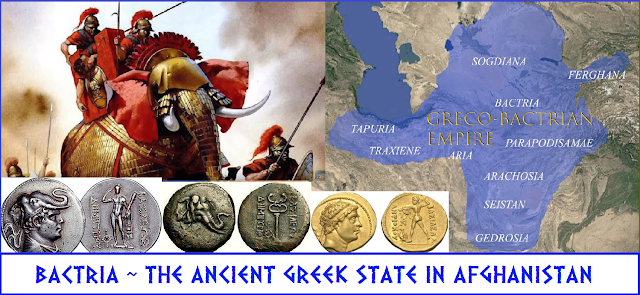Alexander the Great and his army began a massive military campaign in 334 BCE, which resulted in Macedonians establishing many Greek cities across a wide swath of Southeast Asia. His reign, and that of his successors, would eventually reach all the way to the Indian subcontinent.
Alexander and his army conquered vast territories between Greece and India. However, Greek presence became much more dominant in faraway ancient Bactria than in areas that were much closer to Alexander's homeland, Greece.
The Kingdom of Bactria was located north of the Hindu Kush mountain range and south of the Amu Darya river, on the plateau where modern-day Afghanistan, Tajikistan, and Uzbekistan are.
After the death of Alexander, his empire was shared among his army generals. Bactria became a part of the Seleucid Empire, named after its founder, General Seleucus.
Seleucus I and his son Antiochus I established numerous Greek cities.The Greek influence was so overwhelming, that Greek was the dominant language of the region for quite some time.
However, one of the lesser-known reasons for the immense Greek cultural influence in the region was the mass deportations of Greeks to Bactria. During the reign of Darius I, every single one of the citizens of the Greek city of Barca, in Cyrenaica, were deported to Bactria for refusing to surrender suspected assassins to the authorities.
The Persian King Xerxes also sent prisoners to the area. The “Branchidae” were the descendants of Greek priests who had once lived near Didyma and who had surrendered the temple of Apollo to him. The Greek historian Herodotus also records a Persian commander threatening to enslave daughters of the revolting Ionians and send them to Bactria.
Diodotus I, the satrap, or ruler, of Bactria declared independence from the Seleucid kings in 245 BCE, conquering Sogdia and becoming the founder of the great Greco-Bactrian Kingdom. Diodotus and his successors resisted constant attacks from the Seleucids, particularly from Antiochus III the Great.
The Greco-Bactrians created a very powerful army and succeeded in expanding their territory as far as present-day India.
The Greeks who had instigated the Bactrian revolt had become extremely wealthy, partly due to the great fertility of their country. Their wealth enabled them to become masters not only of Bactria, but also of India.
The Greco-Bactrians used the Greek language for administrative purposes; inevitably, local languages were also influenced by Greek, as suggested by their adoption of the Greek alphabet and some Greek words.

Bactrian King Euthydemus I and his son Demetrius I crossed the Hindu Kush mountains and began their conquest of the Indus valley.Soon, they became so powerful that a Greek empire seemed to be on the rise in the East.
However, corruption and internal conflicts tore apart the rising empire. When Demetrius advanced far east of the Indus River, one of his generals, Eucratides, pronounced himself king of Bactria.

Usurpers suddenly appeared in every province. All of them desired to be kings, and the fights amongst them were long and fierce.
Many of them did become kings, as we can see from the many gold coins found centuries later in Afghanistan; but they were kings only within their own provinces. The incessant wars among them had caused great damage, ruining a lot of elements that had led their societies to progress and eventually diminishing the Hellenic element.
After Demetrius and Eucratides, the kings abandoned the Attic standard of coinage and introduced a native one, to attract support from non-Greeks.
Alexander and his army conquered vast territories between Greece and India. However, Greek presence became much more dominant in faraway ancient Bactria than in areas that were much closer to Alexander's homeland, Greece.
The Kingdom of Bactria was located north of the Hindu Kush mountain range and south of the Amu Darya river, on the plateau where modern-day Afghanistan, Tajikistan, and Uzbekistan are.
After the death of Alexander, his empire was shared among his army generals. Bactria became a part of the Seleucid Empire, named after its founder, General Seleucus.
Seleucus I and his son Antiochus I established numerous Greek cities.The Greek influence was so overwhelming, that Greek was the dominant language of the region for quite some time.
However, one of the lesser-known reasons for the immense Greek cultural influence in the region was the mass deportations of Greeks to Bactria. During the reign of Darius I, every single one of the citizens of the Greek city of Barca, in Cyrenaica, were deported to Bactria for refusing to surrender suspected assassins to the authorities.
The Persian King Xerxes also sent prisoners to the area. The “Branchidae” were the descendants of Greek priests who had once lived near Didyma and who had surrendered the temple of Apollo to him. The Greek historian Herodotus also records a Persian commander threatening to enslave daughters of the revolting Ionians and send them to Bactria.
Diodotus I, the satrap, or ruler, of Bactria declared independence from the Seleucid kings in 245 BCE, conquering Sogdia and becoming the founder of the great Greco-Bactrian Kingdom. Diodotus and his successors resisted constant attacks from the Seleucids, particularly from Antiochus III the Great.
The Greco-Bactrians created a very powerful army and succeeded in expanding their territory as far as present-day India.
The Greeks who had instigated the Bactrian revolt had become extremely wealthy, partly due to the great fertility of their country. Their wealth enabled them to become masters not only of Bactria, but also of India.
The Greco-Bactrians used the Greek language for administrative purposes; inevitably, local languages were also influenced by Greek, as suggested by their adoption of the Greek alphabet and some Greek words.

Bactrian King Euthydemus I and his son Demetrius I crossed the Hindu Kush mountains and began their conquest of the Indus valley.Soon, they became so powerful that a Greek empire seemed to be on the rise in the East.
However, corruption and internal conflicts tore apart the rising empire. When Demetrius advanced far east of the Indus River, one of his generals, Eucratides, pronounced himself king of Bactria.

Usurpers suddenly appeared in every province. All of them desired to be kings, and the fights amongst them were long and fierce.
After Demetrius and Eucratides, the kings abandoned the Attic standard of coinage and introduced a native one, to attract support from non-Greeks.
















No comments:
Post a Comment